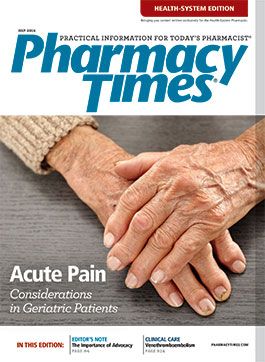Publication
Article
Pharmacy Practice in Focus: Health Systems
The Importance of Advocacy
As the current president of the North Carolina Association of Pharmacists, I have needed to learn about practices and aspects of pharmacy different from those included in my current work setting or for which I was trained.
As the current president of the North Carolina Association of Pharmacists (NCAP), I have needed to learn about practices and aspects of pharmacy different from those included in my current work setting or for which I was trained. As a merged association, NCAP has the opportunity to represent all aspects of the profession. To be effective in my position, I need to understand what is happening in the breadth of pharmacy. Therefore, I frequently challenge myself to consider opportunities to continue advancing the role of the pharmacist in North Carolina. Although some individuals consider our state progressive in terms of pharmacy practice, there are still many opportunities for improving the care we provide our patients.
Unfortunately, these opportunities do not happen by themselves. They are the result of numerous coordinated steps. All of this is bundled in the term advocacy, which requires telling our stories to individuals who have the power to effect change.
Until now, I didn’t fully understand the importance of advocacy for legislative changes and never actively championed a cause. I’ve visited my representatives before, but did not participate much more than that. I now recognize I have not done my part.
The following are some lessons about advocacy that I have learned over the past year while leading NCAP. Although this list is not exhaustive, I think these points are all necessary for effecting positive change.
- Strategic planning. Positive changes do not happen by themselves, but are the result of careful planning. Pharmacy needs to know where it wants to go and have the ability to communicate this vision to others. This is essential for building consensus from the broadest reaches of the profession. Ideally, everyone agrees with the vision and can see how patients benefit from the change.
- Operational plan. It is not enough to agree that a strategy is correct. A detailed plan for accomplishing a goal must be developed. This includes identifying the materials and information necessary for communicating the plan broadly, as well as the individuals who are essential for carrying out the steps.
- Collaboration. Nothing significant can be achieved without the support of others. Besides ensuring most pharmacists in your state agree, gaining allies from physician and nursing associations, among others, is critical.
- Patience. Although I am a person of action, I recognize that advocacy does not result in immediate success. It requires timing, communication, consistency of leadership, and patience. If there is unwillingness to persevere when it appears that a goal is not achievable, success will be difficult. Being present and consistently communicating your message goes a long way toward ensuring success.
- Willingness to participate. This is the area where I have personally grown the most in my position. Although I have tacitly supported many initiatives within our state over the years, I have not gone out of my way to assist. I recognize that if we do not have individuals willing to put in the time and effort, pharmacy practice will not keep pace with the changes occurring in the health care system. If I firmly believe that our patients deserve better than the current system, that unrest should motivate me to act until change happens. I think all of us recognize that the current health care system is not optimal and that pharmacists have knowledge and skills that can help to resolve these issues. We need to commit ourselves to help change our state and national policies that prohibit the broad use of pharmacists.
- Celebrate victory. We definitely do not do this enough in our profession and workplaces. We need to take time to thank everyone for their support and involvement in achievements. Seeing the result of our hard work can motivate future involvement when needs arise.
Although much more than the above goes into advocacy, these points are essential to the overall process. I am hopeful that all of our state and national pharmacy associations are working tirelessly to develop consensus and recommend changes that will enhance pharmacists’ ability to improve the care of our patients. They definitely deserve our best.
I would appreciate your insights and experiences regarding this topic. Let me know what you think by e-mail at [email protected] or follow me on Twitter at @stepheneckel.
Stephen F. Eckel, PharmD, MHA, BCPS, is associate director of pharmacy at the University of North Carolina (UNC) Medical Center, and clinical associate professor at the UNC Eshelman School of Pharmacy.

Newsletter
Stay informed on drug updates, treatment guidelines, and pharmacy practice trends—subscribe to Pharmacy Times for weekly clinical insights.






